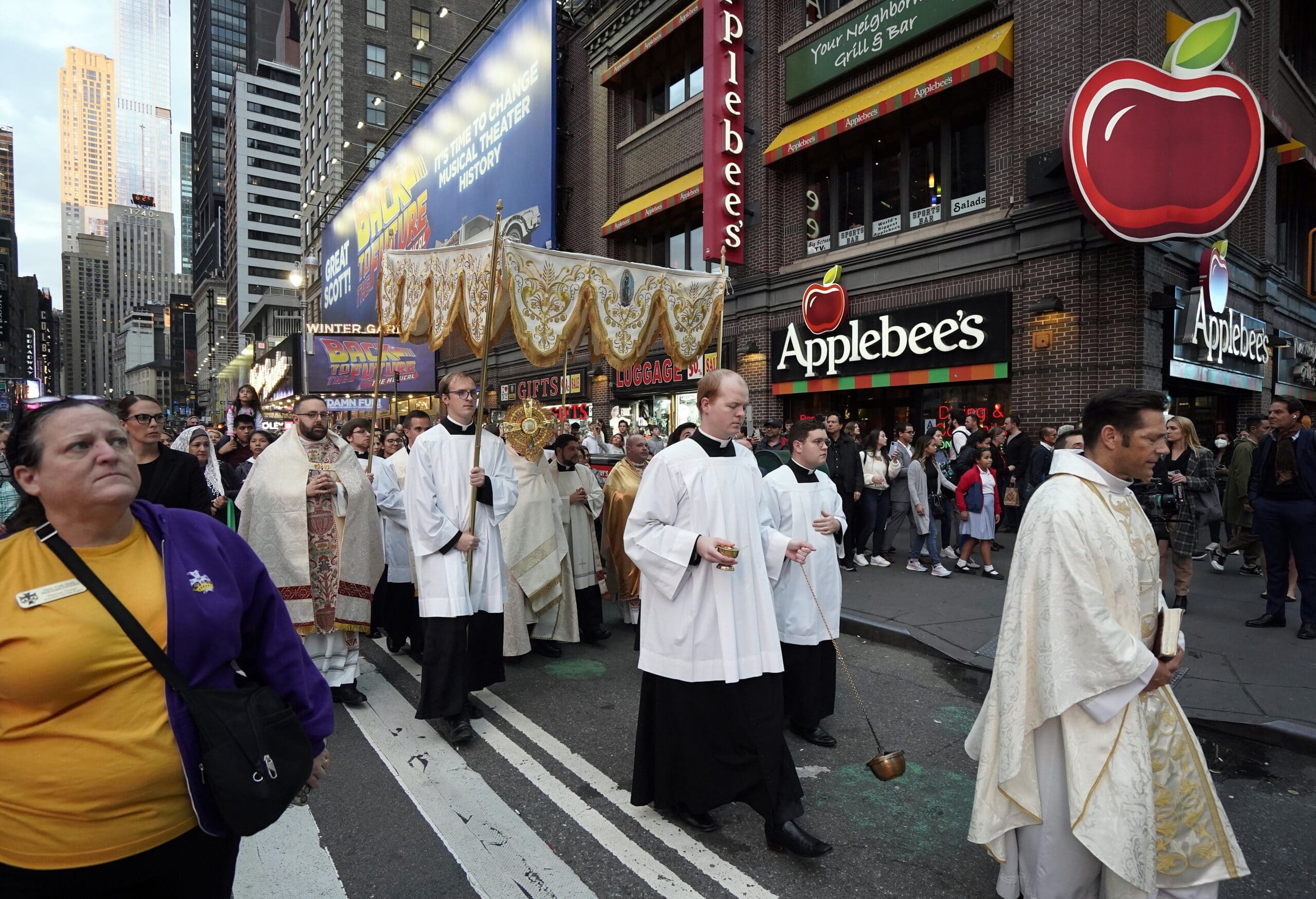Father Mike Schmitz gives mixed reviews on Eucharistic processions
Father Mike Schmitz has mixed feelings about public Eucharistic processions, something he admits is somewhat surprising, given that he led one in downtown Manhattan Oct. 10.
He said there’s both beauty and danger in taking the Eucharist to the streets.
“I’m not a massive fan of ‘let’s take what’s sacred and bring it out into the world in a way that could be massively misunderstood,’ or I’m not convinced it necessarily evangelizes the way that maybe we hope it evangelizes,” the host of the popular podcasts “The Bible in a Year” and “The Catechism in a Year” told OSV News Sept. 15.

Despite his hesitation, he agreed to lead the Eucharistic procession in New York because processions are part of the church’s patrimony, he said, and he is open to whatever fruit the experience might bear — for him, other pilgrims, and passersby.
“There is someone who has to take the lead when it comes to changing our culture,” he said. “This is maybe something that God is initiating.”
Father Schmitz, a popular speaker known for quick-take catechetical lessons on YouTube, is the chaplain of Newman Catholic Campus Ministry at the University of Minnesota Duluth. In 2021, he and Bible scholar Jeff Cavins launched “The Bible in a Year (with Fr. Mike Schmitz),” which hit No. 1 on Apple’s podcast charts. In January, the duo launched “The Catechism in a Year (with Fr. Mike Schmitz)” to complement it. Both are produced by Ascension Press.
The upcoming New York procession he’ll lead is organized by the Napa Institute, a California-based Catholic think tank. It is free and open to the public, who are asked to register at napa-institute.org. The event is part of the Napa Institute’s 2023 Principled Entrepreneurship Conference, held Oct. 10-11 at The Metropolitan Club in New York.

Prior to the procession, Father Schmitz celebrated and gave the homily at a 4:30 p.m. Mass at St. Patrick’s Cathedral. The procession will also return to the cathedral for benediction.
Father Schmitz said he has found Eucharistic processions to be powerful forms of worship in contexts where everyone has been prepared to pray and adore Jesus, such as during Fellowship of Catholic University Students’ SEEK Conferences. But, taking the Eucharist to a secular space means many people — even Catholics — are not expecting to see the monstrance, and don’t know what it is or don’t know how to respond.
Yet, he said, that might be the point.
“Here’s the Holy of Holies taken out of the temple, yet at the same time many people have pointed out that maybe that’s what was meant by the tearing of the veil in the tabernacle, in the temple, from top to bottom,” he said, referring to a detail from the accounts of Jesus’ crucifixion found in the Gospels of Matthew, Mark and Luke. “Not that now the world can enter the Holy of Holies, but now God’s presence can come out into the world.”
He said that people can respond to the invitation present in the Eucharist in the same way they respond to Scripture — seeing it as a mirror, a flashlight or sandpaper. As a mirror, both can help a person see himself or herself as he or she truly is. As a flashlight, both can shed light on something that needs to be seen. And as sandpaper, both can smooth away “rub us in a way that we have to act” even if it’s uncomfortable, he said.
“A procession of Our Lord in the Eucharist himself is that mirror, that flashlight and that sandpaper that shapes us, that shines on us, and that reveals us to ourselves,” he said.
He said that people in a procession need to try to overcome self-consciousness and enter into prayer, despite the distractions.
“As we’re walking along, journeying with the Lord, there is a big temptation to be distracted by that self-preoccupation, there is a big temptation to be distracted by ‘what are people thinking?’ (and) there’s a distraction of ‘what is my experience right now?'” Father Schmitz said, “instead of ‘this is the moment, I’m entering into this, I’ve said yes to this, and I’m part of this worship, I’m part of this procession, and God, whatever it is that you’re doing here, I want to be open to that.'”
In an invitation to the procession posted to the Napa Institute’s Instagram account, Father Schmitz said that the Greek word for “martyr” means “witness.”
While some people give witness to Christ through their death, all Christians are called to give witness with their lives, he said.
“We’re all called to bear witness to Christ in some way, shape or form,” he said, noting that participating in the procession witnesses “to the true presence of Jesus Christ in the Eucharist.”
This article was written by Maria Wiering, senior writer for OSV News.


